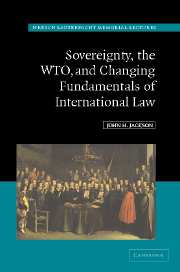Book contents
- Frontmatter
- Contents
- Preface
- Table of statutes and regulations
- Table of cases
- Part I Challenges to fundamental assumptions of international law
- Part II The WTO
- 4 The WTO as international organization: institutional evolution, structure, and key problems
- 5 The WTO dispute settlement system
- Part III The search for solutions
- Appendix: Outline of the Uruguay Round treaty establishing the World Trade Organization
- Notes
- Index
4 - The WTO as international organization: institutional evolution, structure, and key problems
Published online by Cambridge University Press: 29 March 2011
- Frontmatter
- Contents
- Preface
- Table of statutes and regulations
- Table of cases
- Part I Challenges to fundamental assumptions of international law
- Part II The WTO
- 4 The WTO as international organization: institutional evolution, structure, and key problems
- 5 The WTO dispute settlement system
- Part III The search for solutions
- Appendix: Outline of the Uruguay Round treaty establishing the World Trade Organization
- Notes
- Index
Summary
Anyone who reads GATT is likely to have his sanity impaired.
Senator Millikin, at 1951 US Senate HearingI think your difficulty … is the inherent complexity of the subject.… I must admit I am thoroughly confused.
Winthrop Brown, one of the draftsmen of GATT, at 1951 US Senate HearingThe WTO as international economic law and its relationship to general international law
In this and the next chapter we examine the World Trade Organization (WTO) and its dispute settlement system (DSS). This remarkable international institution is one of the newest international economic organizations, but according to many opinions it is also the most important and the most controversial. It is in the specific cases and diplomatic and political problems of the WTO that one witnesses “the devilish detail” of the tensions between nation-state “sovereignty” and international legal norms.
Also remarkable is the degree to which misunderstanding exists about the relationship of the WTO to general international law, and more specifically to international economic law. Indeed, as we have seen in Chapter 2, section 2.4, there is some observed tendency for those concerned with general international law to ignore, or at least overlook, the relevance for international law of the extensive practice which now exists in the IEL context with its young WTO intricate jurisprudence developed through decisions in specific cases.
- Type
- Chapter
- Information
- Publisher: Cambridge University PressPrint publication year: 2006
- 1
- Cited by

